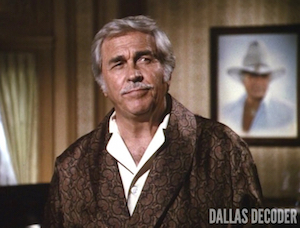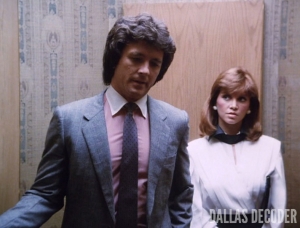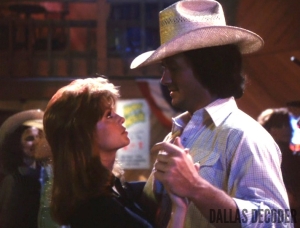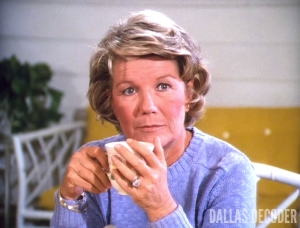
New mom rising
Even after all these years, it’s still strange to see Donna Reed play Miss Ellie. Reed’s first episode is “Homecoming,” and as soon as she enters the frame in the famous scene where Ellie and Clayton arrive at their airport upon returning from their honeymoon, you can see how different the newcomer is from the actress she succeeds, Barbara Bel Geddes. Reed wears a stylish dress and jewelry, her hair is coiffed and when the camera moves in for her first close-up, she breaks into a bright, toothy smile. When Bel Geddes was Mama, did we ever see her teeth?
None of this is to say Reed is miscast as Miss Ellie. Consider the options facing the “Dallas” producers when the ailing Bel Geddes decided to retire in the spring of 1984. Since killing off Mama would have been heresy — and since no one would have bought her leaving Southfork to live happily ever after off-screen with new husband Clayton — the most viable alternative was to recast the role. There’s no disputing the regal Reed was an unusual choice to replace the downhome Bel Geddes, but if the producers had hired an actress who looked and acted more like the original, would it have made us miss Bel Geddes any less? At least Reed offered a new interpretation instead of an imitation.
Of course, this doesn’t make it any less jarring to see Larry Hagman and Patrick Duffy calling Reed “Mama” in the airport scene, or to watch her and Howard Keel retire at the end of the episode to the set that served as Jim Davis and Bel Geddes’ on-screen bedroom for so many years. (As soon as I saw Reed and Keel there, I couldn’t help but flash back to Jock entering the room and finding Ellie in tears after her mastectomy.) To the producers’ credit, they seem to anticipate this will be the audience’s response and build this episode around Clayton moving into Southfork and realizing he’ll be sharing his new home with Jock’s ghost. I’m sure the show would have told this story if Bel Geddes were still playing Ellie, but I get the feeling the producers use it here to send a kind of subliminal message to the audience: Just as you want the Ewings to accept Clayton, we want you to give Reed a chance.
Even if that wasn’t the producers’ intent, that’s what I plan to do. Reed appeared in 23 additional episodes after “Homecoming,” and I want to approach each one with an open mind. No, Donna Reed isn’t Barbara Bel Geddes, but who is? What’s the point of bemoaning the fact that the two actresses have different styles? I give Reed a lot of credit for having the courage to replace one of the most beloved performers on one of the most popular television shows of the 1980s. It didn’t help matters that “Dallas” entered syndication a few weeks before Reed began her run as Ellie, which meant viewers could watch reruns from the show’s glory years with Bel Geddes every weekday afternoon and then tune in to new episodes on Friday nights to see her replacement.
In this instance, those viewers saw an episode that stands up pretty well to anything from the Bel Geddes era. The novelty of Reed’s debut aside, this is the eighth season’s strongest episode yet. I admire how the show devotes so much time to telling the story of Clayton’s introduction to life at Southfork. I especially appreciate how Arthur Bernard Lewis’s script gives us so many different points of view: In addition to the poignant final scene where Clayton addresses Jock’s portrait (“You still live here Jock. It’s still your house”), there’s a scene earlier in the episode where the Ewing brothers wrestle with the fact that a new man will be sleeping in the room Daddy once shared with Mama. It sounds like another example of adult Ewings being concerned with matters they’re too old to be worried about, except I know a lot of grownups in real life who struggle to accept stepparents.
Indeed, this episode is full of little reminders of how unique “Dallas” was among the era’s prime-time soap operas. Yes, this is a show where Sue Ellen Ewing considers buying a $1,095 dress at The Store, but it’s also a show where Ray Krebbs ruins his and Donna’s dinner by forgetting to turn on the microwave. There’s also charm in seeing the Ewings going to the airport to pick up Clayton and Ellie, as well as the scene where the family sits around and reminisces about the old days. These are small moments, but they help make the characters feel like real, knowable people.
Some final thoughts: “Homecoming” marks the beginning of Michael Alldredge’s four-episode run as Steve Jackson, the salvage man Pam hires to recover Mark’s plane wreckage. Alldredge previously appeared during the fourth season as Don Horton, one of the detectives who investigated J.R.’s shooting, and he returns yet again during the show’s final year as Carter McKay’s attorney, Ray King. Additionally, there are some memorable lines in this episode, beginning with J.R.’s crack about Pam’s inheritance from Mark (“I tell you, that woman has a knack for piling up unearned dollars”). Later, when J.R. says John Ross doesn’t know “half the nicknames” people call him, Sue Ellen responds, “That’s because he’s too young to know words like that.”
In an episode about life’s transitions, isn’t it nice to know some things at Southfork never change?
Grade: A
_______________________________________________________________________________________________________________________________________________

Daddy’s home
‘HOMECOMING’
Season 8, Episode 7
Airdate: November 9, 1984
Audience: 22.2 million homes, ranking 1st in the weekly ratings
Writer: Arthur Bernard Lewis
Director: Gwen Arner
Synopsis: Miss Ellie and Clayton return to Southfork, where he feels overshadowed by Jock’s memory. Pam hires a salvage company to search for Mark’s missing plane. Mandy tells Cliff she overheard Sue Ellen confide in Jamie that J.R. is worried about Cliff’s success. Eddie realizes there’s more to Lucy than meets the eye.
Cast: Michael Alldredge (Steve Jackson), Norman Bennett (Al), Roseanna Christiansen (Teresa), Patrick Duffy (Bobby Ewing), Tony Garcia (Raoul), Linda Gray (Sue Ellen Ewing), Larry Hagman (J.R. Ewing), Jenilee Harrison (Jamie Ewing), Susan Howard (Donna Krebbs), Barry Jenner (Dr. Jerry Kenderson), Steve Kanaly (Ray Krebbs), Omri Katz (John Ross Ewing), Howard Keel (Clayton Farlow), Ken Kercheval (Cliff Barnes), Fredric Lehne (Eddie Cronin), Priscilla Beaulieu Presley (Jenna Wade), Victoria Principal (Pam Ewing), Donna Reed (Miss Ellie Farlow), Sherril Lynn Rettino (Jackie Dugan), Marina Rice (Angela), Deborah Shelton (Mandy Winger), Christopher Stone (Dave Stratton), Charlene Tilton (Lucy Ewing), Kathleen York (Betty)
“Homecoming” is available on DVD and at Amazon and iTunes. Watch the episode and share your comments below.




























